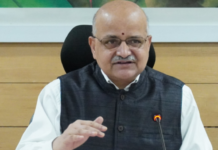By Nirendra Dev
New Delhi– The country’s first “Karigar University” to impart professional skills’ training to artisans like potters, carpenters and ironsmiths may soon come up in Wardha in Maharashtra, the erstwhile ‘karmabhoomi’ (workplace) of Mahatma Gandhi.
The Maharashtra government and the Narendra Modi government at the centre could soon initiate steps to set up the proposed ‘karigar university’ to give a boost to the prime minister’s skill-development mission.

“It will not be skill development per se as we understand by the term in the modern education sense. It is beyond white collared jobs and computers. A village potter or neighbourhood ironsmith in a small town and kasba are also skills. It is high time such work is encouraged and given respect,” a senior Bharatiya Janata Party (BJP) leader told IANS here.
A delegation of BJP leaders and representatives from the Rashtriya Swayamsevak Sangh (RSS)-affiliated organisations made the suggestion to Maharashtra Chief Minister Devendra Fadnavis during a recent meeting in Mumbai.
“In fact, a detailed project report with study background has been submitted to the chief minister who showed keen interest. The matter is likely to be taken up formally by the state government with the Prime Minister’s Office (PMO),” a source said.
The proposed university to promote such crucial but low-profile professions is likely to come up at Wardha’s Sevagram.
The project is being linked to Wardha and Mahatma Gandhi. Sevagram and Wardha had been important milestones of Gandhiji’s life. Many decisions on important national matters and movements were taken at Sevagram. In April 1936, Gandhiji established his residence in a village on the outskirts of Wardha, which he renamed as Sevagram — meaning a ‘village of service’. This year it will be the 80th year of establishment of Sevagram.
“In the agricultural age, unlike the industrial age, focus shifted to land and landowners reigned. In the contemporary setting, knowledge is the asset and those who have the best of tools will rule. The skill development essentially should address this,” the BJP leader added.
“The idea of such a university for traditional non-conventional skilled people has perhaps become all the more important as agriculture alone cannot sustain rural people. In villages, for a family of four brothers, a realisation is dawning that there is a need for alternative job avenues. The craze for white collar jobs is taking us nowhere,” the leader said.
He added that the Maharashtra government and the central government in Delhi understand that the present low level of rural employment is essentially due to the absence of market-driven employment generation in the Indian agriculture sector.
The union ministry of skill development is also working on a road map to shift the entire job scenario from ‘qualification based’ to ‘skill based’.
Echoing the same spirit, a senior BJP office-bearer from Maharashtra said: “The new generation skill development should be based on the process of more than mere learning. It should involve a key process of re-learning and enhancing an individual’s skills.”
India’s job creation ability has been very dismal, and all blame cannot be shifted to the door steps of the central government, and that too on the present dispensation, another BJP leader said.
In the last three decades, studies claim the country has created only about seven million jobs every year, whereas the need is for over 22 million jobs annually.
Compared to China, only two percent of Indian workers — about 10 million — are formally skilled, according to reports.
In vocational courses too, India has only about 5.5 million individuals enrolled every year, compared to many more in China, it is noted. (IANS)






